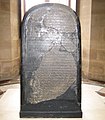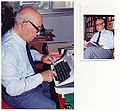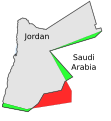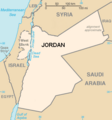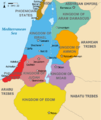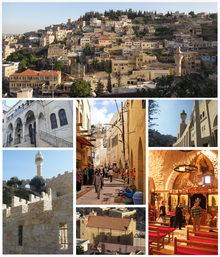Our website is made possible by displaying online advertisements to our visitors.
Please consider supporting us by disabling your ad blocker.
Portal:Jordan
The Jordan Portal  Jordan, officially the Hashemite Kingdom of Jordan, is a country in the Southern Levant region of West Asia. Jordan is bordered by Syria to the north, Iraq to the east, Saudi Arabia to the south, and Israel and the occupied Palestinian territories to the west. The Jordan River, flowing into the Dead Sea, is located along the country's western border within the Jordan Rift Valley. Jordan has a small coastline along the Red Sea in its southwest, separated by the Gulf of Aqaba from Egypt. Amman is the country's capital and largest city, as well as the most populous city in the Levant. Modern-day Jordan has been inhabited by humans since the Paleolithic period. Three kingdoms developed in Transjordan during the Iron Age: Ammon, Moab and Edom. In the third century BC, the Arab Nabataeans established their kingdom centred in Petra. The Greco-Roman period saw the establishment of several cities in Transjordan that comprised the Decapolis. Later, after the end of Byzantine rule, the region became part of the Islamic caliphates of the Rashidun, Umayyad, Abbasid, and the Ottoman. Following the 1916 Great Arab Revolt during World War I, former Ottoman Syria was partitioned, leading to the establishment of the Emirate of Transjordan in 1921, which became a British protectorate. In 1946, the country gained independence and became officially known as the Hashemite Kingdom of Jordan. The country captured and annexed the West Bank during the 1948 Palestine war until it was occupied by Israel in 1967. Jordan renounced its claim to the territory to the Palestinians in 1988 and signed a peace treaty with Israel in 1994. Jordan is a semi-arid country, covering an area of 89,342 km2 (34,495 sq mi) with a population of 11.5 million, making it the eleventh-most populous Arab country. The dominant majority, or around 95% of the country's population, is Sunni Muslim, with the rest being mostly Arab Christian. Jordan was mostly unscathed by the violence that swept the region following the Arab Spring in 2010. From as early as 1948, Jordan has accepted refugees from multiple neighbouring countries in conflict. An estimated 2.1 million Palestinian refugees, most of whom hold Jordanian citizenship, as well as 1.4 million Syrian refugees, were residing in Jordan as of 2015. The kingdom is also a refuge for thousands of Christian Iraqis fleeing persecution. While Jordan continues to accept refugees, the large Syrian influx during the 2010s has placed substantial strain on national resources and infrastructure. The sovereign state is a constitutional monarchy, but the king holds wide executive and legislative powers. Jordan is a founding member of the Arab League and the Organisation of Islamic Cooperation. The country has a high Human Development Index, ranking 99th, and is considered a lower middle income economy. The Jordanian economy, one of the smallest economies in the region, is attractive to foreign investors based upon a skilled workforce. The country is a major tourist destination, also attracting medical tourism with its well-developed health sector. Nonetheless, a lack of natural resources, large flow of refugees, and regional turmoil have hampered economic growth. (Full article...) Selected article -Qualifying industrial zones (QIZs) are industrial parks that house manufacturing operations in Jordan and Egypt. The QIZ program was introduced in 1996 by the U.S. Congress to stimulate regional economic cooperation. Goods produced in QIZ-designated areas in Egypt, Jordan and the Palestinian territories can directly access U.S. markets without tariff or quota restrictions, subject to certain conditions. To qualify, goods produced in these zones must contain a small portion of Israeli input. In addition, a minimum 35% value to the goods must be added to the finished product. The idea was first proposed by Jordanian businessman Omar Salah in 1994. The first QIZ, Al-Hassan Industrial Estate in Irbid in northern Jordan, was authorized to export Stateside by the U.S. Trade Representative in March 1998. As of August 2015[update], there are 13 QIZs in Jordan and 15 in Egypt, exporting $1 billion in goods to the United States. Administratively, QIZs differ from free-trade zones in that free-trade zones operate in one country while QIZs have operations in two countries (Egypt or Jordan jointly with Israel) and are under the jurisdiction of their host countries in addition to U.S. oversight. (Full article...) Selected biography -Hussein bin Abdullah (Arabic: حسين بن عبدالله, Ḥusayn ibn ʿAbd Allāh; born 28 June 1994) is Crown Prince of Jordan as the eldest son of King Abdullah II and Queen Rania. He was a member of the Hashemite dynasty, the royal family of Jordan since 1921, and is considered to be a 42nd-generation direct descendant of the Islamic prophet Muhammad. Hussein is a Major in the Jordanian Armed Forces, started his education in Jordan, and, in 2016, he graduated from Georgetown University with a degree in International History. Since reaching the age of majority in 2012, Hussein served as a regent on several occasions and has accompanied his father on a number of local and international visits. (Full article...) WikiProjectFor editor resources and to collaborate with other editors on improving Wikipedia's Jordan-related articles, see WikiProject Jordan. General images -The following are images from various Jordan-related articles on Wikipedia.
Selected city -Al-Salt (Arabic: السلط Al-Salt), also known as Salt, is an ancient trading city and administrative centre in west-central Jordan. It is on the old main highway leading from Amman to Jerusalem. Situated in the Balqa highland, about 790–1,100 metres above sea level, the city is built in the crook of three hills, close to the Jordan Valley. One of the three hills, Jabal al-Qal'a, is the site of a 13th-century ruined fortress. It is the capital of Balqa Governorate of Jordan. The Greater Salt Municipality has about 107,874 inhabitants (2018). (Full article...)
See also: List of cities in Jordan
Related portalsReligions in Jordan Arab states Other countries Recognized content
Featured articlesGood articles
TopicsSelected topic overview -
CategoriesSelected picture - Credit: Daniel Case Wadi Rum's resemblance to the surface of Mars has made it a popular filming and tourist attraction
Associated WikimediaThe following Wikimedia Foundation sister projects provide more on this subject:
SourcesDiscover Wikipedia using portals
|
Previous Page Next Page






